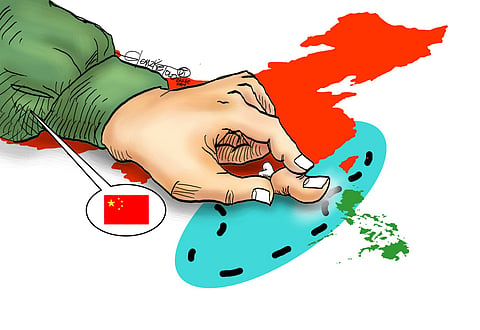
- NEWS
- the EDIT
- COMMENTARY
- BUSINESS
- LIFE
- SHOW
- ACTION
- GLOBAL GOALS
- SNAPS
- DYARYO TIRADA
- MORE

The latest China Coast Guard (CCG) attack on a Philippine resupply mission to Ayungin Shoal underscores the region’s volatility and the broader geopolitical tensions at play. This event has sparked a war of words and differing narratives.
In trying to downplay the incident, Malacañang, through Executive Secretary Lucas Bersamin, described it as just an accident or a misunderstanding.
Defense Secretary Gibo Teodoro, after reviewing the video footage, however, declared it a deliberate, illegal assault that resulted in injuries to eight Filipino Navy personnel, including one who lost a thumb.
The Ayungin Shoal is located within the Philippines’ exclusive economic zone (EEZ) but is also claimed by China under its expansive nine-dash line. The Philippines maintains a small military presence on the BRP Sierra Madre, a grounded World War II-era ship, to assert its claim.
Bersamin, in his initial assessment, opined the ramming of the Philippine Coast Guard tugboats probably stemmed from a navigational error or a communication breakdown, a stance seen by many as an attempt to avoid escalating tensions with China, a significant economic and military power.
By framing the incident as accidental, Malacañang may be aiming to preserve diplomatic channels and prevent a deterioration of bilateral relations, which could have severe economic and security repercussions.
Contrary to Malacañang’s position, however, Teodoro provided a starkly different interpretation after seeing the video. He described the incident as a deliberate and illegal attack by the China Coast Guard, an assessment aligned with the Philippines’ longstanding position on China’s aggressive maneuvers in the South China Sea. These maneuvers include the construction of artificial islands and the militarization of the region.
Teodoro’s stance was rooted in a legalistic and defensive posture, emphasizing the Philippines’ sovereignty and the need to uphold international maritime law, specifically the United Nations Convention on the Law of the Sea (UNCLOS).
Video footage of past incidents, which had been crucial in shaping public and official opinions, showed the China Coast Guard using water cannons and other aggressive tactics against Philippine vessels. The latest incident showed CCG vessels ramming the Philippine rubber boats before boarding them, armed with bolos and knives. They then punched holes in the inflatable vessels and confiscated several firearms in an act described by the military as barbaric and akin to piracy.
Such actions, if unprovoked, suggest a deliberate attempt to disrupt the resupply missions. The context of prior incidents in the South China Sea, where China has repeatedly engaged in similar behavior against other claimants, further supports the interpretation of a deliberate strategy rather than an isolated misunderstanding.
The question now begging to be answered is whether the incident was an armed attack that should warrant the invocation of the Philippines’ mutual defense treaty with the United States. Under the Mutual Defense Treaty, an attack on one nation is considered an attack on the other who must come to its aid.
Despite the gravity of the situation, National Security Adviser Eduardo Año said the incident could not be classified as “an armed attack because by international definition, it is the use of military force, an excessive use of force, that would trigger a collective self defense.”
Although many would not agree, it is probably best to leave it at that. The incident at Ayungin Shoal must be understood within the larger geopolitical context in the South China Sea, considering it is vital to international shipping. China’s aggressive posturing, we would like to believe, is part of its broader strategy to assert control over the disputed waterway by challenging the territorial claims of several Southeast Asian nations, including the Philippines.
In so doing, China could be tripping on its own feet. The world has now seen how it has violated numerous international and domestic laws, including the use of illegal force and the violation of conventions on collisions at sea and the safety of life at sea.
While seeking to avoid a direct confrontation with China, the Philippines has strengthened its alliances with like-minded nations, notably the United States, which has expressed support for the country’s sovereignty and called for freedom of navigation in the South China Sea.
The Philippines now faces the difficult task of defending its territorial integrity while navigating complex international relationships, a challenge that requires a careful balancing act.
